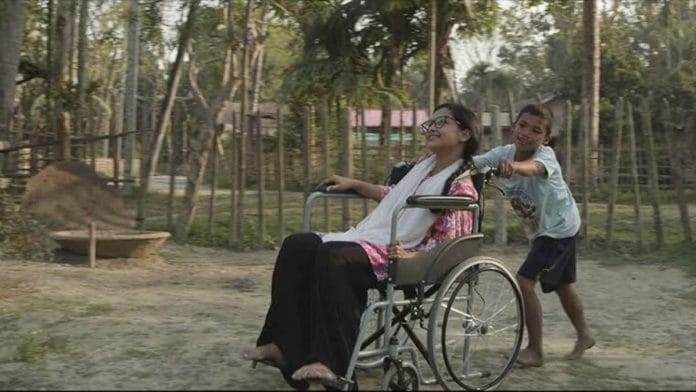Bobby Sarma Baruah’s 2024 Assamese language film Rador Pakhi or Morning Sunshine opens with a deceptively mundane village scene. A mother sweeping the front yard, her husband working in the cowshed. And then the idyll is shattered. The camera moves into the house—a young woman on a bed calls out to her mother. She can’t move. She is in pain. But in the few minutes that it takes the woman in the yard to reach the room, the daughter has soiled her clothes.
As the mother wipes down her legs and thighs, she whispers, with affection but also a touch of frustration, “ Couldn’t you hold it in for a few minutes?”
Rador Pakhi does what few films have the courage to do. It gives the viewer an unvarnished view of life when a family member has a debilitating genetic disorder. The young woman, Jyoti—played by Sulakhyana Barua— has spinal muscular atrophy. As the disease progresses, and the motor neurons in the spinal cord degenerate, patients find it difficult to breathe and even swallow, let alone move.
It leaves Jyoti unable to use her legs or move on her own. There’s no cure for SMA, but certain therapies and medications can help manage symptoms. Jyoti is completely dependent on her parents for everything—from being taken to the washroom to changing her pads.
Based on the life of award-winning Assamese author Sarmistha Pritam, the 129-minute movie looks at Jyoti’s life in a village in Assam’s Nagaon, as she refuses to let her condition define her.
“I would not call it a biopic because there are certain elements we have not included or fictionalised. But I wanted to convey her life as much as possible,” said Baruah.
Baruah spent days with Pritam, having conversations with her, observing her day-to-day life. She even got the cast to meet Pritam so that they could understand the characters they were playing better.
“As human beings, we tend to get exhausted with the smallest struggles in our lives, but when I came across Sarmistha, I was moved, and I decided hers is a story that needs to be told on celluloid,” said Baruah.
Also read: ‘You’ve put on a bit of weight though’—how this film on mother-daughter bond begins
The caregivers and their lives
In the movie, Jyoti’s father, a poet, and her mother have dedicated their lives to taking care of her. And in doing so, they face what every ageing parent fears—the future of their younger child.
In one scene, the father (Arun Nath) imagines reading a poem at a poetry, while waiting for his daughter outside the washroom. The mother (Bina Patangia) breaks his daydream by calling out to him. It’s these small moments that make the movie what it is.
When her brother, who lives in the city, tells her that on his next visit, he will get her a wheelchair, Jyoti’s father objects.
“As long as I am alive, a wheelchair will come into this house. My daughter is not disabled,” he says.
But the passage of time takes its toll on the parents. Soon, Jyoti’s father starts losing his memory, and he is diagnosed with Alzheimer’s Disease.
But Jyoti’s life is defined by the same routine. Her stifling existence is emphasised by a seller of plastic buckets and other utensils, with a loudspeaker blaring the same advertisement on repeat.
Pragyan (Kamal Lochan), who slowly falls in love with Jyoti, is her ray of hope. He encourages her to write and even gets her a wheelchair.
The wheelchair gives Jyoti access to spaces beyond her room and bathroom.
Jyoti’s parents have their own misgivings about Pragyan and the idea of marriage for their daughter.
“If you were well, we would have gotten you married too, like your siblings,” says her mother. Jyoti responds, teary-eyed, “Is it my fault that I am like this?”.
Also read: The unending Indian housewife grind—Renuka Shahane’s Marathi film Loop Line shows the trap
Spotlight on what matters
This is not the first time Baruah has opted for a biopic. Baruah made Sonar Baran Pakhi (The Golden Wing) based on the life of celebrated Goalparia folk singer Pratima Barua Pandey. Made in the Rajbangshi language, it won the Grand Jury Prize for Best Feature Film at the 15th Indian Film Festival of Los Angeles (IFFLA) 2017.
It is also the first film made in the Rajbangshi language.
In 2018, she repeated her feat of giving lesser-known dialects a chance with her feature film Mishing or Apparition. The film is in Sherdukpen dialect, a part of the Kanauri branch of the Tibeto-Burman family and has only 4,000 odd speakers in a few villages of Arunachal Pradesh’s Kameng district. The film is about the group’s belief in spirits.
The Guwahati-based self-taught filmmaker won the National Award in a special language category, reserved for those that fall outside Schedule VIII of the Constitution for the film, for Mishing.
With Rador Pakhi, Baruah wanted to emphasise the importance of choosing to see the light at the end of the tunnel.
“For a woman who is dependent on her parents, Jyoti still aims to have a life of her own. When she finds love, she does not see it as a change of caregiving from parents to a partner. She is clear—she wants love but also a life of her own that she has built,” said Baruah.
Rador Pakhi had its premiere at the International Film Festival of India 2024. It was also screened at the Bangalore International Film Festival and Third Eye Asian Film Festival. The film had its world premiere at the Indian Film Festival of Melbourne 2025 on 20 August.
Rador Pakhi
Director -Bobby Sarma Baruah
Cast- Sulakhyana Baruah, Kamal Lochan, Arun Nath, Bina Patangia
DOP-Sumon Dowerah
Editor-Ratul Deka
This article is part of ThePrint’s series on independent films. Views are personal.
(Edited by Theres Sudeep)






